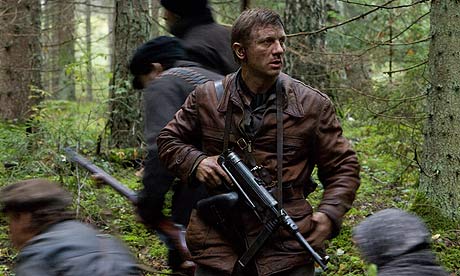
Daniel Craig plays Tuvia Bielski, one of four brothers who resisted the Nazis in Defiance. Photograph: Karen Ballard/PR
I'll never view Daniel Craig in the same way again; he managed a creditable performance as one of four brothers who refused to surrender their lives and those of other Jews to the horrific Nazi extermination machinery. This, at a time when the inexorable drive to isolate Jews, surround and capture them, place them into ghettoized work gangs and ultimately deliver them to death camps was taking place all over Europe.
This story, however, takes place in Byelorussia, now part of Poland, where pogroms and anti-Semitism among Russians, Poles and Ukraines had a particularly long tradition in the culture and where many of the death camps were constructed with that knowledge. That knowledge being that it was not very likely that much of a protest would arise from among the occupied inhabitants who would no doubt see it in their best interests to invest their own activities in lock-step with the Nazis.
Not only were their Jewish neighbours detested by and large, mistrusted and held in contempt, but they were also seen as a detriment to others' material well-being with the widely-held belief that they sought to control everything; global finances, news dissemination and ownership, social-cultural norms -- to enrich themselves on the avenue to world domination. The scant handful of non-Jews who believed otherwise and risked their lives to aid Jews escape death represents the salvation of humanity.
When Jews were rounded up and whatever of value they possessed suddenly inherited by the Nazis, their abandoned farms, homes and whatever was left that could hold some value became the property of their neighbours. Infamously, at the conclusion of WWII, when survivors returned to their villages expecting to be welcomed and to retake possession of their lives, their homes were found to be occupied and 'owned' by their one-time neighbours who in some instances were prepared to finish what the Holocaust left uncompleted.
In this atmosphere of ghettoes being emptied by the Third Reich commandants tasked with the vital task of eradicating Jews from existence, rumours of what awaited those thinking they were being taken to work camps caused some to flee to the surrounding forests for haven from what they knew really awaited them: the final solution of death. They had already witnessed the barbarity of the Nazis and those they recruited to their aid.
Identified by the yellow star, isolated from mainstream society, unemployable, lacking any vestiges of human rights, sequestered into enclosed ghettoes, transported to work camps until they were exhausted from labour and privation they were further transported to the ovens of the death camps, some of which had two divisions; that of labour, that of death. The four Bielski brothers who witnessed atrocities taking place with the aid of local authorities determined to save themselves.
And in the process they gathered up other Jews anxious to seek any means possible to separate themselves from what seemed the inevitable. Living in their various forest enclaves from which they were forced time and again to abandon what they had built, to resettle elsewhere in the forest surrounded by farms and villages, they managed to evade death, to shelter and feed thousands of Jews despite deadly encounters with local gendarmes and German searchers prepared to annihilate them.
That, in the end, after years of evasion and living within the confines of a forest, building rough shelters and foraging for food looted from local communities; caring for one another as best they could, and experiencing being strafed by German airstrikes and by tank fire, 1,200 Jews and the four brothers managed to survive the war. As unbelievable a story, albeit a true one, as the exploit of a fascist storm battling as an Axis coalition, the Allied resistance of the free world.
No comments:
Post a Comment